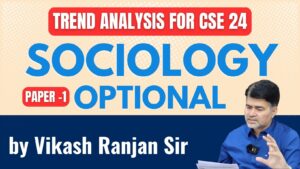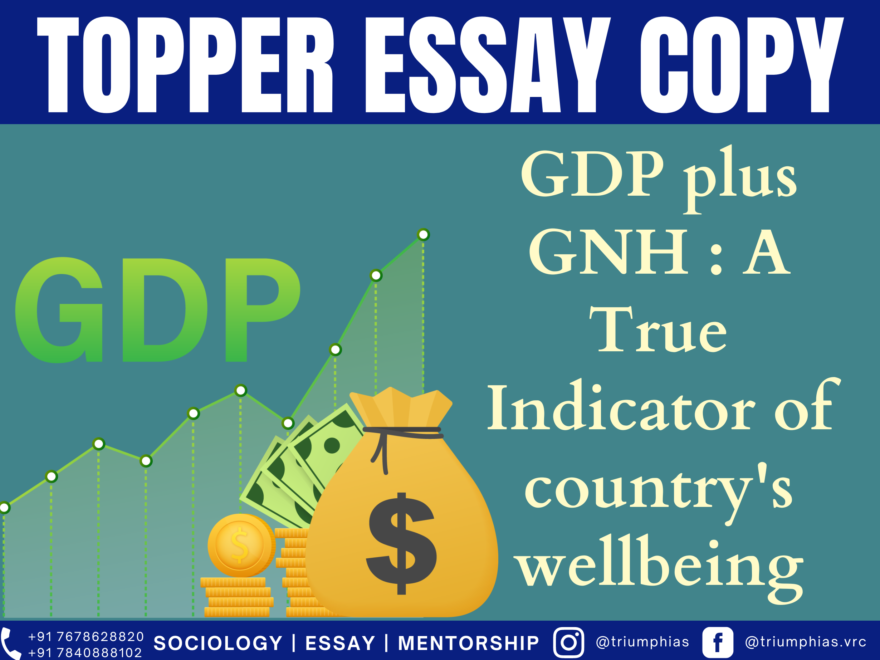
RAHUL DEV BOORA took Mentorship under the
Personal Guidance of “Vikash Ranjan Sir”
Essay Topic:
GDP plus GNH: a True Indicator of a country’s well-being.
(Relevant for Essay Writing for UPSC Civil Services Examination)
GDP plus GNH: a True Indicator of a country’s well-being.UNDP (United Nations Development Programme) recently published the Global Happiness Index. It covers a range of parameters with citizen surveys & government reports as key ingredients. The results of such a comprehensive report were much anticipated by everyone. Although, to no surprise, Nordic countries once again found their place on top of the table. What really surprised me were the contrasting results of some wealthy countries. It did really shake my conscience. Saudi Arabia, the major Gulf power, was nowhere in the top 100. For a country endowed with rich fossil fuel resources, a tourism hub for the world’s largest religion, and per capita income exceeding some of the developed OECD countries, the result for them was hardly palpable for me. On the other hand, Bhutan, a small country packed between hills & two rising global powers, was well there challenging the so-called western GDP model of development. This really made me think about what constitutes the well-being of a country which leads to the happiness of all. Achieving well-being of a region is a humongous task in itself. Not only because of the resources and effort that go into it but also due to its unprecise definitions. Sociologists, economists, philosophers, all have their own connotations for the term and develop different models to achieve the same. Is the idea of well-being just new or has it been there for some time in parallel? The Harappan civilization was well known for its splendid drainage system, trade activities, self-sufficiency in food production, etc. Recently, archaeologists in Rajasthan discovered a skeleton of a smiling couple dating back to the Harappan era. Carbon dating and spectral studies show that the skeleton was strong and might have lived a delightful life. So, well-being was there in Harappan times when there was no money involved. It really shows that the notion of well-being in economic and monetary terms is surely flawed. Husen Tusang (a Chinese traveler) came to the court of the last Hindu emperor. Although, at that time trade was declining and the economy was not in a good state, he found that the people of Hindustan were living a happy settled life. The Britishers, in the race of colonialism, acquired colonies spreading across all continents. It made rich trade and boasted itself of civilizing the uncivilized. But were all the citizens of those colonies happy? The Indian case would surely reply with a no to it. With increasing GDP and achieving the tag of fastest-growing economy, India has also witnessed rising inequality with the top 1% wealthy people cornering 65% of wealth created in the last year and the bottom half getting hold of just 1% wealth as per Oxfam Inferential report. Patriarchal structure, crimes on the rise, atrocities against vulnerable scheduled caste & tribes people, home to the world’s largest multidimensional poor – one can surely say that this economic growth is not going to achieve well-being for all. The economic growth and per capita income of North Korea are not that bad, but the country has one of the world’s most unhappy populations. Restrictions on free speech and fundamental human rights have made the citizens’ lives a living hell. Similarly, Hong Kong unrest over Chinese government communist and restrictive influence shows that it takes more than being the world’s second-largest economy to tie a knot with. So, since the GDP model is flawed, what have Nordic countries done to achieve well-being and happiness? Many of them have followed the socialist democratic model. They are not countries with big GDP numbers, but they surely have found the formula for well-being. Well-being is a state where citizens have ample opportunities and freedom to gain meaningful education, a healthy lifestyle, and career opportunities. To achieve all these, they must get the required basic facilities with which they can build their capacities to live a happy life. “Lust, greed & anger make one’s life equivalent to hell” – Bhagavad Gita. A country like India, which is surrounded by troubled neighbors & crime circuits, has much more to do than just focusing on overall well-being. “Violence anywhere is a threat to prosperity everywhere.” Lastly, well-being has to be inclusive. “Antyodaya” has to be the principle in government policies. And along with human & economic capital, environmental capital should never be neglected. |
To master these intricacies and fare well in the Sociology Optional Syllabus, aspiring sociologists might benefit from guidance by the Best Sociology Optional Teacher and participation in the Best Sociology Optional Coaching. These avenues provide comprehensive assistance, ensuring a solid understanding of sociology’s diverse methodologies and techniques
Why Vikash Ranjan’s foundation Classes for Essay?
Proper guidance and assistance are required to learn the skill of writing essay topics in CSE examination. VIKASH RANJAN SIR at TRIUMPH IAS guides students according to the Recent Trends of UPSC, making him the Best Essay Teacher for Essay writing UPSC.
At Triumph IAS, the Best Essay Writing Coaching platform, we not only provide the best study material and applied classes of Essay for IAS but also conduct regular assignments and class tests to assess candidates’ writing skills and understanding of the subject.
Choose The Best Essay Writing Teacher for IAS Preparation and Know our Approach for Essay?
- The Programme is Planned & Executed in a Way that You Write a good Essay for obtaining Effective Score of 140 Plus.
- In this programme we provide Classes on
- How to INTRODUCE The Topic in Context of the THEME of the Essay
- How to Elaborate & Explain the Topic-Theme on Temporal Scale & Sectoral Scale as well as Intellectual Scale in the MAIN BODY of the Essay.
- How to Sum up the Topic in CONCLUSION in Context of the Essay Topic Theme.
- ︎We will Teach You How to use the Knowledge Matrix of General Studies & Optional to write a Good Essay more Logically and Coherently.
- After the Classes You have to “Write to Learn & Learn to Score” .This means You have to Write the Essay Test Papers & Learn from the Feedback & Discussions.
Why Essay is Important and What We Offer in “Essay Test Series”?
- Triumph’s Essay Upgradation Test Series (Under Personal Guidance of Vikash Ranjan Sir) doesn’t only focus on improving student’s linguistic skills but also focus on improving student’s ability to comprehend the topic-sentence (subject) recall & relate the facts, concepts, propose thesis-statements, and logically assimilate the ideas & counter ideas with clarity in expression on temporal & Sectoral Scales of knowledge.
- Further students are provided one-on-one INTERACTION* Session with Vikash Ranjan Sir. Students get personal feedback on their strength and weaknesses, regarding what is ‘good about their essay and what more should be done to make it a better one’ by Vikash Ranjan Sir.
Why to take up this “Essay Test Series and Foundation” Course?
- Essay is Low hanging Fruit. Marks in Essay is Effectively Contributing in Final Selection in New Pattern of Mains Exam. With a Well Developed ‘Knowledge Matrix and Rigorous Practice’, One can Score upto 160 + in Essay. So IAS Aspirants should never Ignore Essay Preparation
- Inculcating Writing Competency in Essay for IAS, which is Different from Essay in English, Essay in School and College.
Follow us :
🔎 https://www.instagram.com/triumphias
🔎https://www.youtube.com/c/TriumphIAS
🔎https://t.me/VikashRanjanSociology
Find More Blogs…
| Compare and contrast Karl Marx’s and Max weber’s | Karl Marx- Historical Materialism |
| Position of Women In the Modern Indian Society | Sociology: Social system and pattern variables |
keyword: GDP plus GNH: a True Indicator of a country’s well-being,GDP plus GNH: a True Indicator of a country’s well-being,GDP plus GNH: a True Indicator of a country’s well-being,GDP plus GNH: a True Indicator of a country’s well-being,GDP plus GNH: a True Indicator of a country’s well-being,GDP plus GNH: a True Indicator of a country’s well-being,GDP plus GNH: a True Indicator of a country’s well-being,GDP plus GNH: a True Indicator of a country’s well-being,GDP plus GNH: a True Indicator of a country’s well-being,GDP plus GNH: a True Indicator of a country’s well-being,GDP plus GNH: a True Indicator of a country’s well-being,GDP plus GNH: a True Indicator of a country’s well-being,GDP plus GNH: a True Indicator of a country’s well-being,GDP plus GNH: a True Indicator of a country’s well-being,GDP plus GNH: a True Indicator of a country’s well-being

